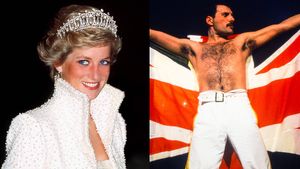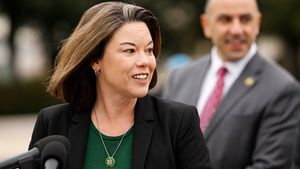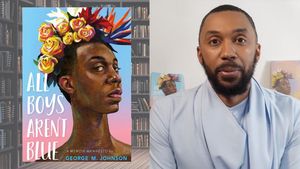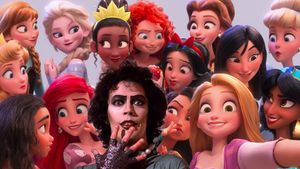Some Like It Hot — the Tony-nominated Broadway musical inspired by the Billy Wilder film starring Marilyn Monroe — owes some of its origin story to Smash, according to composers Marc Shaiman and Scott Wittman. In fact, the two productions are in the same “multiverse.”
The creative partners behind the theatrical hit Hairspray from 2007 are alumnus of the cult NBC drama about the Great White Way. The song “Let’s Be Bad” first appeared in Smash as one of the numbers in the fake Broadway musical, Bombshell, about Monroe’s life. A rewritten version now appears in Some Like It Hot, which boasts music by Shaiman and lyrics by both Shaiman and Wittman.
In the 1959 film, Monroe played Sugar Kane, the lead singer of an all-female band whose new members, Josephine (Tony Curtis) and Daphne (Jack Lemmon), are, in reality, two cross-dressing men named Joe and Jerry hiding from the mob. That film was based partly on a 1935 French production, Fanfare of Love.
Broadway’s Some Like It Hot keeps many of the key characters and plot points of its 20th-century predecessor, which is beloved by LGBTQ+ fans for its queer themes and its defiance of the era’s censorship rules. Notably, the film ends with a famous line, “Nobody’s perfect,” from Daphne’s rich suitor, Osgood Fielding III (Joe E. Brown), after Daphne comes out as a man.
The musical’s creators have adapted the film — and expanded its diversity — for a new generation. The show is set in 1933, just a few years later than the film (1929), but Sugar and Daphne are now played by Black actors, Adrianna Hicks (Six) and J. Harrison Ghee (Mrs. Doubtfire), respectively, and the period’s racism is addressed in the story. Additionally, Ghee is nonbinary, and their identity is now reflected in Daphne’s gender journey.

In another Smash connection, Neil Meron and Craig Zadan, who executive produced the NBC drama, first pitched Shaiman the idea for a new stage adaptation of Some Like It Hot with a Black female lead; Zadan died in 2018, and the musical’s program is dedicated to his memory. Also, the show stars Smash alum Christian Borle as Joe/Josephine and is directed by the Tony-winning Casey Nicholaw (The Book of Mormon, The Prom).
In addition to these creatives, the new queering of Some Like It Hot is owed in part to the book’s writers, Matthew López (The Inheritance) and Amber Ruffin (The Amber Ruffin Show). Further fleshing out intersectional themes, Kevin Del Aguila plays Osgood in a scene-stealing role that intertwines courtship of Daphne with a closeted Latinx identity. In fact, each character has a hidden “longing to find their tribe and...peel back their onion,” Wittman shares.
In terms of incorporating LGBTQ+ themes, “the door was ajar” from the boundary-pushing of the Wilder film, Wittman says. He cites a note at the end of the original script, shared with him by López, which stated, “The world isn’t ready for what happens next.”
“So it wasn’t until this year that they were [ready], maybe,” he notes wryly.
Some Like It Hot may be the ideal vehicle for promoting acceptance. On its surface, the musical has all the trappings of classic Broadway, among them dazzling song-and-dance numbers like the opener, “What Are You Thirsty For?,” and even a train scene to kick off the journey from Chicago to Los Angeles in “I’m California Bound.” But this frame of spectacle is also “an inroad to people,” says Shaiman; among his collaborations with Wittman is Hairspray, another socially progressive musical.
Some Like It Hot promotes acceptance of folks across the spectrum of race and gender identity; Shaiman calls it “our love letter to all the people that we have loved and lived and worked and played and laughed with since we first moved to New York [in the ’70s].” Both refer to a line in the script from Osgood during a love scene with Daphne, which acknowledges the hurdles they may have as a budding interracial queer couple: “The world only reacts to what it sees, and in my experience, the world doesn’t have very good eyesight.”

Shaiman and Wittman have had their own love story. The pair met in New York City in the summer of 1976 after Shaiman had seen an off-Broadway production called Boy Meets Boy. To end his night, Shaiman stopped at the famous musical watering hole Marie’s Crisis and began playing the piano, an act that caught the attention of the bartender, who referred him to Wittman.
At the time, Wittman was 21 and Shaiman was 16. They immediately hit it off and began a lifelong professional relationship and a romantic one that lasted 35 years. “I like to say…1976 was the year of the Tall Ships [Festival], Son of Sam, Legionnaires’ disease, and Marc Shaiman for me,” Wittman jokes.
Since their meeting, the two have written and arranged music for just about every gay icon, including Bette Midler, Liza Minnelli, and Barbra Streisand. In fact, Shaiman became Midler’s accompanist at age 18 before graduating to her musical director. His Hollywood credits for musical scoring and arrangement include beloved films like The First Wives Club, Hocus Pocus, Beaches, Sister Act, and South Park: Bigger, Longer & Uncut.
It was Shaiman’s work on South Park that caught the attention of Margo Lion, the late theater producer who brought Hairspray to Broadway. She wanted to recruit Shaiman as a lyricist, and he in turn wanted to bring Wittman on board. She asked them to write a few songs on spec, and they immediately sat down and wrote now-classics like “Good Morning Baltimore,” “Welcome to the ’60s,” “Big, Blonde & Beautiful,” and “I Know Where I’ve Been.” They’ve been a “burning engine” on Broadway ever since,” says Shaiman. Other credits include Catch Me if You Can and Charlie and the Chocolate Factory — and the anticipated musical adaptation of Smash on Broadway.
This engine has been fired up by the recent tide of anti-LGBTQ+ legislation in the U.S. And they have harsh words for red-state drag bans, which threaten shows like Hairspray and Some Like It Hot.
“It’s not hyperbole to say that this is very much like it was in Nazi Germany, where they start banning books and start banning this and banning that,” Shaiman says. “And there are much larger forces who are really trying to change the world in some very terrible ways.”
But Wittman sees Broadway — and Some Like It Hot — as playing an integral role in changing the world for the better. “I think it’s important if you can change people’s minds and you can entertain them while doing it,” he says. “I mean, I see a lot of happy people walking up the aisle at the end of the show and getting on tour buses, so there must be something there…in the way, maybe, that La Cage [aux Folles] was when it opened up [during] the AIDS era…. That’s all we can hope for.”
“When people would see Hairspray, it’s all so joyous and colorful and funny. But people might leave the theater a little adjusted, having things in their heart and minds just changed a bit,” Shaiman says. “You can accomplish a lot if you entertain a new audience at the same time.”
“If you do it in a showbizzy way,” Wittman concludes, “sometimes it’s good spinach.”
This article is part of the Out May/June issue, out on newsstands May 30. Support queer media and subscribe -- or download the issue through Amazon, Kindle, Nook, or Apple News.























































